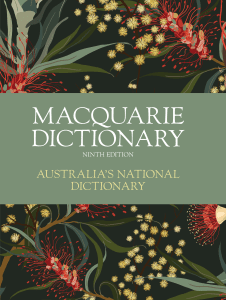The release of the Macquarie Dictionary Eighth Edition should be a celebration of all of the new and wonderful words that have entered our lexicon in the past few years. However, while we take great delight in most, there are always a number which make us feel like dying a little inside. Whether it’s the awful sound of the word, its construction, its meaning, or even the dismal fact that it exists at all, its inclusion in the Macquarie is based upon an established usage within Australian English.
Deepfakes and incels fill me with terror (both contenders for the Macquarie Dictionary Word of the Year in 2018). Underboobs, twitterature and sneaters also make me worry about our future. Zoats are definitely something I won’t be eating anytime soon. Spoopy sounds plain ridiculous but does guarantee a laugh if you find the right video so I’ll give this one a pass.
Talking about words we dislike always acts as a catalyst for readers to voice their objections to their pet hates. In a world in which every single person or thing seems to be described as unique, I feel quite giddy when actually hearing it used simply to mean “of which there is only one”. Don’t worry, the use of literally (see here for other words we hate…) and versing still generate the most strident of our emails.
And whether we like it or not, COVID-19 has not only seen the creation of numerous new terms but also a sharp increase in usage of existing words and phrases, such as unprecedented, the new normal and PPE (personal protective equipment). But just how many times can something be unprecedented and become the new normal?
Some of the new COVID-19 terms are being used at such high frequency that they feel like they have been part of our language forever, such as social distancing, iso and flatten the curve. I’d much rather avoid the awkward (and not socially-distanced) elbow bump, settle in with a quarantini and cook up some fakeaway.
What established and emerging words do you hate? We’d love to know.





